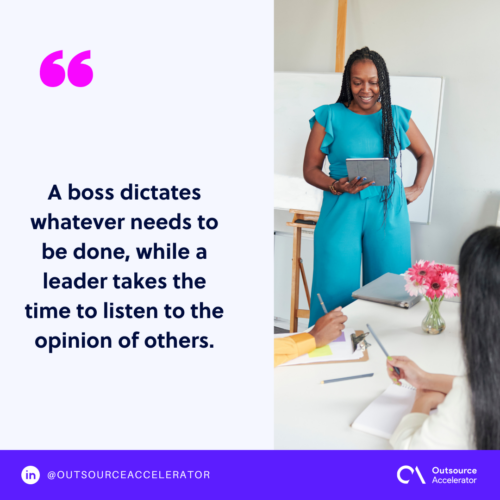Boss vs leader: Key differences between the two roles

Most workers look for someone to work for, whom they can also turn to for support. While the title of a boss or a leader is given to someone who steers the group, there is still a difference between these two roles.
This article will discuss what sets a boss and a leader apart and what is the most effective role to encourage growth in your team and the company.
Who is a boss?
A boss is someone who is in charge of a team or business. They supervise their employees by giving orders and assigning various tasks to them.
Bosses have strong personalities and are focused on business outcomes rather than personal relationships. Their responsibilities tend to navigate more on the business side of the company.
Bosses usually perform the following duties:
- Organizing tasks and deadlines
- Building strategic plans
- Delegating the tasks for every member
- Meeting goals

Who is a leader?
Leaders also hold a dominant position in the workplace. However, instead of being business-focused, they are primarily visionaries.
They take an active part in making positive changes in the workplace, which includes relationships between colleagues, business practices, and communications with the group.
Moreover, leaders know how to inspire and influence their members. Most of the time, they have the qualities of foresightedness, excellent communication skills, and the capability to stimulate work, appreciate others, and take responsibility.

Boss vs leader: How do you differentiate the two?
In essence, these two roles have the same duties and objectives within the organization. However, they have a different approach to reaching their goals.
These are some of the things that differentiate a boss vs a leader.
Dictator vs listener
The first difference between boss vs leader is how they value collaboration within the team. A boss dictates whatever needs to be done, while a leader takes the time to listen to the opinion of others.
Bosses give orders to employees that they sometimes forget to let others speak. They can also be too focused on the business that they do not see it necessary to ask for their team’s input on their projects.
Leaders, meanwhile, are more open to hearing fresh ideas and willing to explore new things. Their eagerness to know others’ views inspires collaboration among their groups and builds a more positive work environment for everyone.
Teaching vs guiding
Another difference between boss vs leader is that the former teaches their team the straightforward way of how to do their tasks. They set up systems and processes that need to be followed to perform tasks efficiently.
Meanwhile, leaders allow their teams to think of the most effective ways to perform their tasks. Instead of strictly imposing a formula, they give enough autonomy to their team members, guiding them to do their jobs and make decisions on their own.
Quick fixes vs sustainable solutions
In solving complications within the company, most bosses prioritize the things happening at present. Meanwhile, leaders are focused on delivering sustainable solutions for the situation.
This means that bosses will look for quick fixes to patch up the situation, while leaders will try to look for the most appropriate response to help the team avoid running into problems in the future.
Hierarchy vs influence
Bosses rely on their position. They always show their authority in the workplace and demand respect, knowing they have both the power and control of their team. It is their desire to maintain the hierarchy in the workplace.
On the other hand, leaders rely on their influence. Because of this, they make sure that the rules apply to them too. They act as models of the behavior they wish to see within the team.
Fear vs confidence
The most crucial difference between boss vs leader is how they affect the emotions of the people around them.
Bosses are known to create an atmosphere of fear. This conditions their employees to only say the things bosses want to hear and not offer opposing views.
In contrast, leaders like to build their employees’ confidence in the organization. They know that with enough trust, their team could voice out their real opinions, which can help resolve each problem.
Moreover, they are ready to see the full picture from their group’s perspective – the good and the bad – to reach their company’s goals.

Boss vs leader: Which one should you be for your team?
At this point, you may be wondering: what is more effective for a business? Should you be a boss or a leader to your team?
Though bosses could be intimidating to work with, they could also be proven effective in some work environments. Their straightforward attitude and ability to work quickly could be crucial, especially in fast-paced and high-stress workplaces.
On the other hand, leaders are vital in environments where creativity and independence are highly valued. Their casual and easygoing methods can inspire people to think of new things to add value to the business.
Despite their difference in attitudes and methods, the most important thing is that both bosses and leaders help organize the company. Their visions align with their ultimate goal of enabling growth and development in the company and in their employees.







 Independent
Independent




